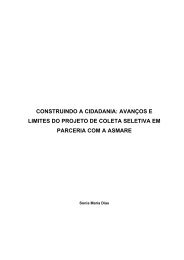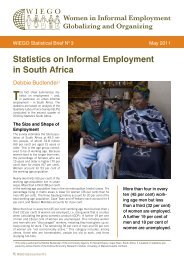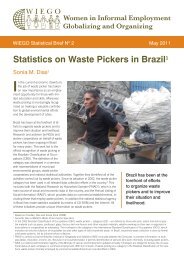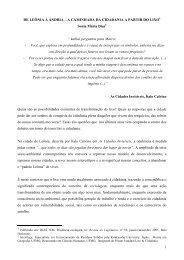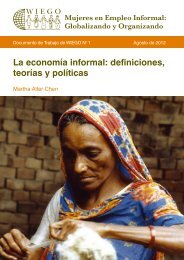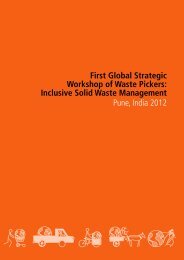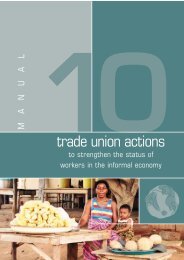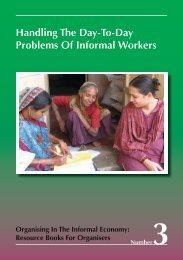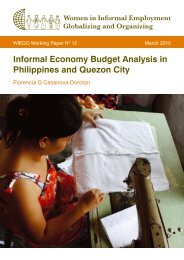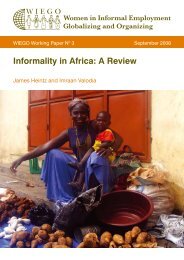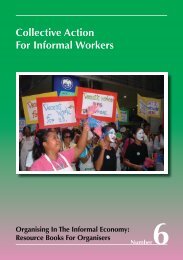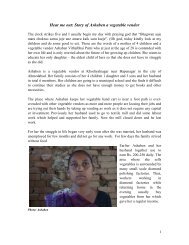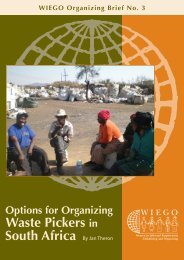Organizing on the Streets: A Study of Reclaimers in ... - Inclusive Cities
Organizing on the Streets: A Study of Reclaimers in ... - Inclusive Cities
Organizing on the Streets: A Study of Reclaimers in ... - Inclusive Cities
- No tags were found...
You also want an ePaper? Increase the reach of your titles
YUMPU automatically turns print PDFs into web optimized ePapers that Google loves.
<str<strong>on</strong>g>Organiz<strong>in</strong>g</str<strong>on</strong>g> <strong>on</strong> <strong>the</strong> <strong>Streets</strong>: A <strong>Study</strong> <strong>of</strong> <strong>Reclaimers</strong> <strong>in</strong> <strong>the</strong> <strong>Streets</strong> <strong>of</strong> Cape Town3. MethodologyThe ma<strong>in</strong> purpose <strong>of</strong> this project was to ga<strong>in</strong> <strong>in</strong>sight <strong>in</strong>to <strong>the</strong> <strong>in</strong>formal and formal ways <strong>in</strong> whichreclaimers work<strong>in</strong>g <strong>in</strong> <strong>the</strong> streets <strong>of</strong> Cape Town are currently organized. This was d<strong>on</strong>e through athree-part research process:• Desk-top research <strong>on</strong> reclaim<strong>in</strong>g and <strong>the</strong> waste management and recycl<strong>in</strong>g <strong>in</strong>dustry <strong>in</strong> CapeTown. Included here was <strong>the</strong> identificati<strong>on</strong> <strong>of</strong> organizati<strong>on</strong>s work<strong>in</strong>g with reclaimers <strong>in</strong>Cape Town, and ga<strong>the</strong>r<strong>in</strong>g basic <strong>in</strong>formati<strong>on</strong> <strong>on</strong> <strong>the</strong>ir activities.• A scop<strong>in</strong>g exercise <strong>in</strong> three areas <strong>of</strong> Cape Town – Salt River-Woodstock, Site B Khayelitsha,and Philippi-Gugulethu, <strong>in</strong> order to develop a sense <strong>of</strong> <strong>the</strong> broad trends am<strong>on</strong>gst <strong>the</strong> lives<strong>of</strong> reclaimers <strong>in</strong> Cape Town.• In-depth fieldwork, <strong>in</strong>clud<strong>in</strong>g <strong>in</strong>terviews, <strong>in</strong> <strong>on</strong>e targeted area <strong>of</strong> Cape Town. The areaselected was Philippi-Gugulethu.3.1 Tra<strong>in</strong><strong>in</strong>g FieldworkersBefore carry<strong>in</strong>g out <strong>the</strong> scop<strong>in</strong>g exercise, a group <strong>of</strong> four activists was tra<strong>in</strong>ed as researchassistants who, al<strong>on</strong>g with two ILRIG researchers, carried out <strong>in</strong>terviews for <strong>the</strong> scop<strong>in</strong>g and <strong>in</strong>depth<strong>in</strong>terviews. Two human rights <strong>in</strong>terns also spent a week work<strong>in</strong>g with <strong>the</strong> project. 2In <strong>the</strong> tra<strong>in</strong><strong>in</strong>g sessi<strong>on</strong>s, reclaim<strong>in</strong>g and where it fits <strong>in</strong>to <strong>the</strong> City’s waste management andrecycl<strong>in</strong>g functi<strong>on</strong>s was discussed, as well as <strong>the</strong> value cha<strong>in</strong>, and <strong>the</strong> ec<strong>on</strong>omy as a whole.We outl<strong>in</strong>ed why WEIGO was <strong>in</strong>terested <strong>in</strong> reclaimers and we discussed <strong>the</strong> importance, fororganiz<strong>in</strong>g purposes, <strong>of</strong> establish<strong>in</strong>g how reclaimers refer to <strong>the</strong>mselves.We <strong>the</strong>n moved <strong>on</strong> to <strong>the</strong> field work and <strong>the</strong> role <strong>of</strong> <strong>the</strong> research assistants. We went over <strong>the</strong>questi<strong>on</strong>naires for <strong>the</strong> buy-back centres and for <strong>the</strong> reclaimers, and our chosen method <strong>of</strong> carry<strong>in</strong>gout <strong>the</strong> scope. The ethics <strong>of</strong> research were discussed, as well as <strong>the</strong> letter <strong>of</strong> <strong>in</strong>troducti<strong>on</strong>, <strong>the</strong> use<strong>of</strong> photography, <strong>the</strong> dist<strong>in</strong>cti<strong>on</strong>s between observati<strong>on</strong>s and facts, and <strong>the</strong> importance to <strong>the</strong> project<strong>of</strong> every<strong>on</strong>e <strong>in</strong>volved. The survey and researcher reflecti<strong>on</strong> forms both had secti<strong>on</strong>s that explicitlyasked for researchers’ observati<strong>on</strong>s, which needed to be completed at <strong>the</strong> end <strong>of</strong> each day.Pers<strong>on</strong>al research experiences were shared, and <strong>in</strong>cluded do<strong>in</strong>g <strong>in</strong>terviews <strong>on</strong> sanitati<strong>on</strong> for aproject <strong>on</strong> women and public health, to work<strong>in</strong>g with reclaimers <strong>on</strong> <strong>the</strong> streets <strong>in</strong> Cape Town. Wediscussed how <strong>the</strong> survey was designed <strong>in</strong> four parts so that <strong>the</strong>re was flow as well as <strong>the</strong> opti<strong>on</strong><strong>of</strong> generaliz<strong>in</strong>g or skipp<strong>in</strong>g secti<strong>on</strong>s if reclaimers did not have a lot <strong>of</strong> time. Work<strong>in</strong>g <strong>in</strong> pairs forsafety as well as practical support was recommended, as this would also facilitate <strong>the</strong> flow <strong>of</strong>c<strong>on</strong>versati<strong>on</strong> and help to ma<strong>in</strong>ta<strong>in</strong> eye c<strong>on</strong>tact.We spoke about challenges <strong>in</strong> <strong>in</strong>terviews: What if some<strong>on</strong>e doesn’t want to talk to you? Orsome<strong>on</strong>e is <strong>in</strong> a rush? What about <strong>the</strong> different languages spoken <strong>in</strong> Cape Town? Because <strong>of</strong> <strong>the</strong>range <strong>of</strong> experience with <strong>in</strong>terviews, <strong>the</strong> research assistants were able to share <strong>the</strong>ir previouschallenges and suggest creative soluti<strong>on</strong>s to fieldwork practicalities.We divided <strong>in</strong>to teams that could cover <strong>the</strong> anticipated different languages spoken <strong>in</strong> CapeTown. As <strong>the</strong> research evolved, <strong>the</strong> comb<strong>in</strong>ati<strong>on</strong>s <strong>of</strong> researchers shifted accord<strong>in</strong>g to need, basedsometimes <strong>on</strong> language, sometimes <strong>on</strong> how well some<strong>on</strong>e knew a specific area, or who neededtime to flesh out <strong>the</strong> survey forms after <strong>in</strong>terviews.2 Research assistants: Letty Madosi, Anele Mbi, Jean Beukes and Elize Petoors. Interns: Dogu Büyükyağcıoğluand Mat<strong>the</strong>w Evans. ILRIG researchers: Nandi Vanqa-Mgijima and K<strong>on</strong>i Bens<strong>on</strong>.3



